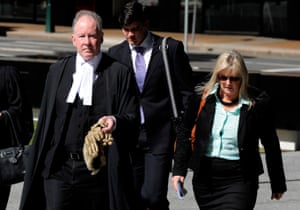Prisoners Require Healing
Debbie Kilroy was featured on Australian Story tonight. What is clear in Debbie’s story is that she carried enormous pain as she was told as a teenager that she was responsible for her father’s heart attack whilst she was in a correctional facility. She carried deep pain for years, not realising this guilt she felt drove her behaviour. Thus forcing a person to change won’t work, they must release their pain and heal. Healing is the key outcome if society wants peaceful citizens.
Debbie made a decision to study law and became the first female prisoner to be admitted to the bar as a lawyer. She has been very effective as she is working to keep women out of jail and to advocate for those who do not have a voice. I really enjoyed her story. So much misunderstanding and ignorance around behaviour. Let’s hope she gains more influence as government’s are slow to change.
Here is an article by the Guardian on this incredible woman.
https://www.theguardian.com/australia-news/2017/jan/04/time-served-how-debbie-kilroy-went-from-jail-to-advising-the-government-on-sentencing
Time served: how Debbie Kilroy went from jail to advising the government on sentencing
The only convicted drug trafficker to be admitted as an Australian lawyer has been appointed to Queensland’s Sentencing Advisory Council – and she wants to abolish prisons

Debbie Kilroy, whose story is one of the great reversals of fortune in Australian legal history, has broken another mould.
The only convicted drug trafficker to be admitted as a lawyer in this country, Kilroy is now almost certainly the only person who advocates abolishing prisons to sit on a statutory body guiding governments and courts on criminal sentencing.
Her appointment to the Queensland Sentencing Advisory Council last month was the latest example of defying expectations in a life that, according to the government that chose her, meant she “brings a unique set of experiences”.
Kilroy was a young mother of two and the wife of a rugby league star when she was sentenced to six years in jail in 1989 for selling cannabis to undercover police.
The product of a childhood disrupted by abuse and stints in juvenile prisons, Kilroy got a degree in social work while behind bars. Building on her prisoner advocacy through the Sisters Inside organisation and her award-winning human rights work on her release, she stunned many in the legal community by gaining court approval to become a solicitor in 2007.
Kilroy is certainly the only sentencing council member who has ever witnessed a prison murder. She was sitting beside her friend Debbie Dick when Dick was stabbed to death with sharpened barbecue forks in 1990. Kilroy was wounded when she tried to intervene to stop the attack.
Invited months later to a mediation session in the prison chapel with the killer and her friends, Kilroy and her friends planned to arrive with hidden weapons, bent on revenge.
The idea of a “calm conversation in the chapel” – which Kilroy says came courtesy of a “do-gooder” organisation that failed to grasp the volatile, escalating reality of prison violence – could have proved catastrophic had a suspicious guard not scotched the meeting.
“Knives had been stolen from the kitchen, knives had been stashed, because prisons are violent places and the only way you respond to violence is with more violence,” Kilroy says now. “We were going there to kill these other women that had just killed our friend a few months ago. This is how volatile it was. This is when people don’t understand how prisons operate and they think they do. They actually can cause murder or violence, a lot of trauma.”
Dick’s murder shone a light on conditions in the overcrowded women’s section of Brisbane’s notorious Boggo Road jail and, in time, prompted a new approach by prison authorities. This included setting up prisoner committees that engaged the women in the running of the prison, a move driven by the then head of corrective services, Keith Hamburger. As the running of the prison became less oppressive, and rival factions of inmates bitterly divided by Dick’s death remained separated, Kilroy’s impulse for vengeance faded.
It was Hamburger who last month told the royal commission into the protection and detention of children in the Northern Territory that building new prisons would simply lock in an endless cycle of incarceration.
Kilroy is familiar with the dynamic. She reflects that after Boggo Road, which was overcrowded with 104 women at the time of the murder, “we built a new 260-cell prison at Wacol to stop overcrowding and now we’ve got over 700 women in prison”.
Kilroy, who was one of Hamburger’s “guinea pigs” as a member of a “street kids” prisoners committee, has proposed that corrective services revive the idea to cope with present overcrowding.
“It gives women something interesting to do, gives women a say in the running of the prison,” she says. “Obviously it’s not about looking after the front door, which people freak out about. But have a committee about the food.
“Women are starving and that’s why they’re assaulting each other, because they’re fighting over goddamn food. Right now.
“Women who I get bail through our bail program, they’re saying, ‘I’m fucking starving, there’s no food.’ You get punched out for your food. They’re even back to rations like the old days in Boggo Road.”
Kilroy’s support for the abolition of prisons is well-known to others on the sentencing council, including the assistant police commissioner Tracey Linford, who heads the intelligence, terrorism and major events command.
Kilroy has argued that the failure of prisons as a model of punishment and rehabilitation is shown by the fact more than half of female inmates who are released will return behind bars. She is influenced by abolitionists including the US academic and activist Angela Davis, who argues that a future beyond prisons lies in a justice system rooted in the idea of reparations for wrongdoing rather than retribution.

Kilroy does not believe she will see the end of prisons in her lifetime. But “the struggle that we’ve got to be in is to look at how we … get people out of prison and keep them out of prison”, she says.
“I definitely won’t be on the Sentencing Advisory Council advocating for harsher sentences or mandatory sentencing.”
Kilroy says there will be “robust conversations” about sentencing and its effects on “the most marginalised and disadvantaged”, particularly Indigenous Australians, and the need to break down “racism, misogyny and sexism within the legal frameworks”.
The council, which is called on by the court of appeal and the attorney general to advise on sentencing matters, was revived in 2016 after being disbanded by the former Liberal National government in a cost-cutting exercise.
Kilroy says the council has a key role in educating the public amid the “law-and-order hysteria” conveyed by politicians and media. She says basic misunderstandings persist about sentences, such as the seemingly “early” release of criminals after time served on remand and the fact that charges don’t equate to guilt.
She also notes the deeply dispiriting effect of remarks occasionally out of the mouths of judges and youth prison officers to the effect that offenders are a lost cause.
“I get overwhelmed with grief at times in court when I’m representing someone and a judge or magistrate actually says to a person, ‘There’s no hope for you ever, is there?’,” she says. “You can’t say that to a person because there’s always hope, there’s always a chance for change.”
Kilroy should know. A child victim of domestic violence, she spent her youth in and out of detention and institutional care. She married someone else with a troubled background, Joe Kilroy, an Indigenous man who had grown up in an orphanage and Queensland’s notorious BoysTown facility. He became a rugby league star and she was a young mother who worked behind the bar at football clubs.
Kilroy recalls the racism that stood in the way of “Smokin Joe”, who was considered “too black” for signing by a major Sydney club despite being named the world’s best fullback. Police in the Brisbane city watchhouse had a picture of Joe with a carton of “goon” – casked wine – pasted to his lips with a racist slogan, in full view of anyone who walked in, Kilroy says.
The couple, who smoked cannabis and sold it to cover the expense, were targeted in an undercover police sting. They had come to the attention of investigators pursuing Joe’s brother-in-law, who, unbeknown to them, was then a major trafficker.

An undercover investigator continued to hit them up for drugs while they were on bail (Kilroy for the Ronald Biggs-worthy surety of $150,000).
Kilroy at one point faced a mandatory life sentence, with police accusing her of trafficking heroin. “It was insane,” she says. Kilroy fought that charge but she and Joe both pleaded guilty to the cannabis charges and went to jail in a high-profile fall from grace, with Kilroy framed as “the wicked witch of the west”. They remain married.
In jail, looking beyond the shock of her friend’s murder and a crushing stint, Kilroy pushed hard for study opportunities. She began a University of Queensland degree in social work, recalling the role of misguided social workers in her own youth.
Kilroy was told at her first lecture that “my own life was worth five credit points” right away as relevant experience.
Finding that social work “didn’t challenge me intellectually because I was taught about things I’d lived through or was living through”, Kilroy pursued a law degree. Her admission as a solicitor, the first convicted criminal to be accepted by the Queensland supreme court, was a watershed moment.
The judge who admitted Kilroy, the future chief justice and Queensland governor Paul De Jersey, also offered congratulations after signing off on her appointment to the sentencing council.
De Jersey was among the many – though not all – judges who “actually believe” in the role of the justice system in rehabilitation, Kilroy says. Her drive to become a lawyer, despite her past, was in part to test that idea.
“That was going to be my next argument to take on with the state and the court system: ‘You keep telling us every time you sentence us to prison and still do till today, you’re going to prison for rehabilitation.’ Well if I’m not rehabilitated at that time with my law degree, stop saying it.”
Her other reason to become a lawyer?
“Because that’s another arena that fucks us all over,” she says. “You get done over by social workers, the professionals or psychs, and you get done over in the criminal injustice system because they talk about equality before the law, natural justice, all this stuff, and it’s actually not true in practice.”
One of Kilroy’s best friends, now a judge but then a barrister, told her she wouldn’t be admitted. “Just another argument,” Kilroy told her, and disclosed everything she could possibly track down about her voluminous juvenile and serious adult criminal history.
De Jersey’s judgment in Kilroy’s favour, which boiled down to the fact that she had overcome her past to become a fit and proper person at that time, is still studied in law schools.
Kilroy recalls later appearing before De Jersey to support the admission of a law graduate who had worked in community legal centres after doing jail stints for armed robbery.
“There I was, a convicted drug trafficker, moving the admission of a convicted armed robber: ‘Your honour, we’re here,’” Kilroy says, laughing. “You want to talk about rehabilitation? Here we are.” No one opposed.
